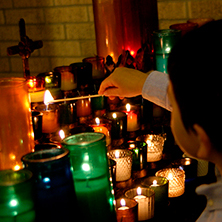- Home
- Our Community
-
Offices & Ministries
- Administrative Offices (A-N)
-
Administrative Offices (O-Z)
- Planning, Properties & Housing
- Public Relations & Communications
- Research
-
Spiritual Affairs
- Home
- Churches and Ecclesial Communities with valid Baptism
- Registration Forms for Baptism, First Holy Communion, Confirmation, and RCIA
- Marriage Preparation
- Celebration of Holy Mass Outside of a Sacred Space Protocol
- Exorcism Protocol
- Healing Service Protocol
- Visiting Clergy-Laity Protocol
- Selected Pastoral Notes on Sacraments and Sacramentals
- Faculties for Clergy
- Temporal Affairs
- Western Bishops Office
- Volunteer Screening
- Pastoral Ministries
- Social Justice & Outreach
- Our Faith
- Outreach
- Contact Us
- Search

Spiritual Works of Mercy
1. Instruct the ignorant
“Philip ran up and heard him reading Isaiah the prophet and said, ‘Do you understand what you are reading?’ He replied, ‘How can I, unless someone instructs me?’” – Acts 8:30-31
“It is an illusion to think that faith, tied to weak reasoning, might be more penetrating; on the contrary, faith then runs the grave risk of withering into myth or superstition.” The most urgent task today is “to lead people to discover both their capacity to know the truth and their yearning for ultimate and definitive meaning of life.” - St. John Paul II, Fides et Ratio, 48 and 102
Lived out in the Archdiocese of Toronto:
2. Counsel the doubtful

“If we look at the present time, we can perhaps say what is most urgent to council, provoking questions, in particular questions concerning the meaning of life and the future, “the fundamental questions which pervade human life: Who am I? Where have I come from and where am I going? Why is there evil? What is there after this life?” - St. John Paul II, Fides et Ratio, 1.
Lived out in the Archdiocese of Toronto:
3. Admonish sinners
“If your brother sins [against you], go and tell him his fault between you and him alone. If he listens to you, you have won over your brother. If he does not listen, take one or two others along with you, so that ‘every fact may be established on the testimony of two or three witnesses.’ If he refuses to listen to them, tell the church. If he refuses to listen even to the church, then treat him as you would a Gentile or a tax collector.” – Matthew 18:15-17. Also known as “fraternal correction,” admonishing sinners should never be done as a judgement, but as a service of truth and love, addressing the sinner not as an enemy, but a brother.
Lived out in the Archdiocese of Toronto:
- Spiritual Direction
4. Bear wrongs patiently
“He who is slow to anger is better than the mighty, and he who rules his spirit than he who takes a city.” (Pv 16:32).
To patiently endure in a free and loving way a relationship with someone who is annoying, unfriendly, boring, sluggish, uncouth, is in line with the love of enemy. It is also an art when this attitude encourages reflection on oneself to discover within us that which is also annoying and unbearable.
Lived out in the Archdiocese of Toronto:
5. Forgive offences willingly

Love of enemies is Jesus’ most demanding requirement and often considered the hallmark of Christian life and conduct. During the Year of Mercy, Pope Francis reminds us of the importance of the sacrament of penance and reconciliation: “So many people, including young people, are returning to the Sacrament of Reconciliation; through this experience they are rediscovering a path back to the Lord, living a moment of intense prayer and finding meaning in their lives. Let us place the Sacrament of Reconciliation at the centre once more in such a way that it will enable people to touch the grandeur of God’s mercy with their own hands. For every penitent, it will be a source of true interior peace.” - Misericordiae Vultus, 17
Lived out in the Archdiocese of Toronto:
6. Comfort the afflicted
God comforts us with the kindness of a shepherd, the affection of a father, the ardor of a bridegroom and a husband and the tenderness of a mother. “Blessed be the God and Father of our Lord Jesus Christ, the Father of compassion and God of all encouragement, who encourages us in our every affliction, so that we may be able to encourage those who are in any affliction with the encouragement with which we ourselves are encouraged by God.
For as Christ’s sufferings overflow to us, so through Christ does our encouragement also overflow.” (2 Cor 1:3-5)
Lived out in the Archdiocese of Toronto:
- Catholic Family Services of Toronto
- Sisters of Life Visitation Mission
- Deacon Robert Kinghorn, street ministry
7. Pray for the living and the dead

“Whether we realize it or not, prayer is the encounter of God’s thirst with ours. God thirsts that we may thirst for him… Christian prayer is a covenant relationship between God and man in Christ.” - Catechism of the Catholic Church, 2560 and 2564.
Lived out in the Archdiocese of Toronto:

